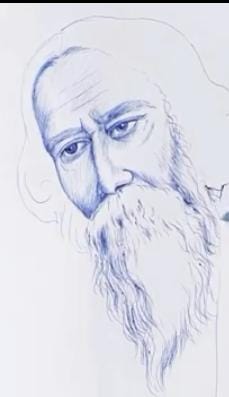Tagore was one of the greatest thinkers of the world of all ages. He was a ‘karmayogi’—a tireless man of action. We find the artist in multiple shades. He was a universal man beyond the periphery of national borders. He was never touched by the narrowness of caste, creed, religion or region. That is why Rabindranath is ever relevant to us and the world. He was ever ready to supply us food for thought in rain, summer or winter.
Rabindranath was never a blind patriot. Rather it can be said that he was a worshipper of truth and justice. Unlike our present day intellectuals, he was always outspoken to uphold the sanctity of truth and justice. He fought against ills and odds and championed the cause of humanity in his life-long struggle. He criticized the blind form of patriotism which is now enjoying a hay day across our country. ‘Tagore’s criticism of patriotism is a persistent theme in his writings. As early as 1908, he put his position succinctly in a letter replying to the criticism of Abala Bose, the wife of a great Indian scientist, Jagadish Chandra Bose: ‘Patriotism cannot be our final spiritual shelter; my refuge is humanity. I will not buy glass for the price of diamonds, and I will never allow patriotism to triumph over humanity as long as I live.’
Rabindranath Tagore himself lived through the tumultuous times that led up to India’s independence and the novel ‘The home and the world’ was a way of him voicing his own thoughts disguised in the form of literature and it can be said that Tagore uses his real life experiences and opinions to form this novel. Swadeshi literally means “of our own country”. It was a nationalist movement where foreign goods were to be boycotted and there was promotion of buying domestic goods. Initially, it started as a non-violent and peaceful movement but it soon turned out ugly and violent. Even though the whole novel revolves around the Swadeshi Movement, Tagore does not support it but instead he gives the readers two radically contrasting approaches of nationalism by Nikhil and Sandip. Sandip is a passionate man who will do anything in order to get India its freedom and doesn’t care about what it takes to achieve that. Nikhil is a supporter of education for women and even helps Bimala in learning English by appointing a tutor for her. Even though his sister-in-law, the Bara Rani, constantly accuses his wife of having too many privileges and criticizes her modernity, he still supports Bimala. He is a modern man who wants his wife to be educated and free. He doesn’t believe in the traditional notions of marriage. He wants Bimala to interact with the outside world and come out of the purdah of her home. The author creates a clear division between the concept of ‘home’ and the ‘world’.
A woman, Bimala, has been married to Nikhil, a notable, for nine years, when comes at home another man and friend of Nikhil, political radicalist Sandip. Bimala is soon metaphorically nicknamed “Queen Bee”, that is the queen of the national hive. She is tempted by the passion of patriotism represented by Sandip, whereas her husband represents a certain cosmopolitan wisdom, cold and dispassionate. The action mainly takes place at home, and the world outside the home is affected by “Queen”‘s wavering behaviour. She falls rapidly in intellectual and sentimental infatuation for Sandip. However, this leads her to actions she regrets. Attempting to correct the course of actions set, she sends her brother Amulya to death.
Not directly related to this novel, my personal concern is to investigate historically how this opposition came into being. In this book, patriotism is associated with sentiments, infatuation, sensuality, desire, conquering, lying, radical change, concrete and direct principles, partisanship, for the greater good of the community. Cosmopolitanism is associated with truth, reason, dispassionate reflection, abstract ideas, long-term goals, moral standards, stability, for the good of everyone.
To Tagore a nation is not merely a piece of land. He sees it with the eyes of the universe. He wants to see his land fulfilled in all aspects. That is why he builds Shantineketan and Sriniketan for multiple developmental activities—modern agriculture, cattle rearing, fishery, handicrafts, development of Gram Panchayet, economic development of his subjects, removal of the curse of untouchability, health care facilities for the poor villagers, child and women education, vocational education, alleviation of poverty, maintenace of environment, greenary and ecosystem, scuplture and architecture. In pre-independent India such a versatile man of action was indeed rare. He had deep respect for the freedom fighters. His independent and self-relient India was freed from the blemishes of narrow boundaries of caste, creed, religion or region.


Comments
Post a Comment